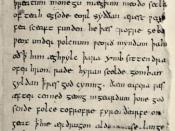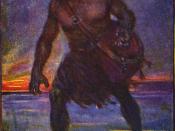Niki Fellows
English 3300
Beowulf: A Christian Commentary on Pagan Society
Beowulf is one of the greatest poems that exhibit the characteristics of conversion in a pagan society. There are beginnings of change, evident in the poem, from a pagan history to an acceptance of a new Christian meaning. This history of a pagan hero was infused with Christian symbols and morals to help smooth the conversion for pagans. When studying Beowulf, it is important to uncover the meanings and symbols of what Grendel and his mother represent in a Christian society with reference to the pagan society, as well as, look at the final fight between the dragon and Beowulf and Beowulf's pride. History is a major part of understanding Christian symbols apparent in Beowulf and understanding his actions in a pagan society.
Medieval Christianity perceives "monster" as a reference to someone with a birth defect that was believed to be a sign from God of bad lineage or a foreshadowing of horrible events.
The poem is shaped by the three monsters Beowulf must fight, each the symbol of an inhuman presence in the society. The inhumanness being that they are outcasts and are forced out by society to live beyond human realms. Beowulf had come to Hrothgar as a man-payment in a wergild society, and he used it to his benefit to attain his reputation and, according to Scandinavian pagan society, heroes continued to live in death by song and poem honoring the feats they conquered. Beowulf could be considered a pagan history as given evidence in the poem itself: "So the song was sung, the lay recited / the sound of revelry rose in the hall" (I. 1052). His feats were so great that his memory will survive in poem and song.
For twelve years, Grendel...


